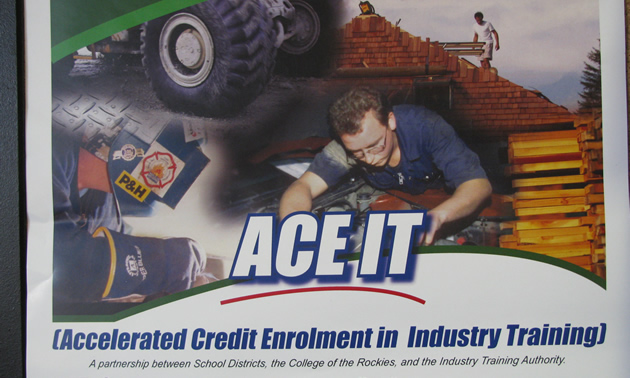Ace It: An early start to a career in the trades
The Industry Training Authority, local school districts and College of the Rockies offer dual credits for aspiring tradespeople

Ace It is a dual-credit program for high school students who wish to begin training for a career in the trades. — Marie Milner photo
As a program name, Accelerated Credit Enrolment in Industry Training is a bit of a mouthful. Its acronym, Ace It, is an easier, catchier handle, and students enrolled in the program at College of the Rockies (COTR) have been loving Ace It since it began in 2007.
“Ace It is a wonderful opportunity for students to get a head start, save a year and do something in their Grade 12 year that they really have a passion for,” said Brian Conrad, regional transitions co-ordinator of the Ace It program. “Most Ace It programs are delivered at post-secondary institutions, with Red Seal instructors, and the tuition is subsidized.”
Layers of benefit
Ace It is a dual-credit program for students who have not yet graduated from high school. Students apply to a Foundation Trades Training Program, of which there are nine at COTR, and they generally do it in their Grade 12 year. They are triple registered with the Industry Training Authority, their school district and College of the Rockies.
If their marks are 70 per cent or better, students achieve triple credit: 1) they receive Level 1 Technical Training with the Industry Training Authority; 2) they get up to 24 Grade 12 credits toward their graduation—and in the case of Heavy Duty Mechanics they get 36; 3) they also get college certification as having completed a COTR Foundation Trades Training Program.
Before they enrol in the program, applicants are encouraged to be “Student for a Day,” which means they spend a day with the class at the college to make sure they definitely want to spend the last year of high school doing the program they’ve chosen.

Brian Conrad, regional transitions co-ordinator and international project facilitator, College of the Rockies — Photo courtesy Brian Conrad
“We want to ensure success for the students,” Conrad said. “We emphasize essential skills as well: numeracy, literacy and problem-solving. We also encourage the students to get all of their required graduation courses done in Grade 11 so that they’re free to be up at the college for their entire Grade 12 year.”
No strings for employers
An apprentice needs about 6,000 hours of paid workplace training to to achieve journey certification. However, while students and the college certainly depend on industry for employment and sponsorship, short-term contracts are now much more common than are long-term ones, and there is no requirement for the employer to commit to a long term of employment for the apprentice.
Apprentices often work with a number of different employers over the course of four years, even journeying from province to province, depending on where the work is available.






Comments